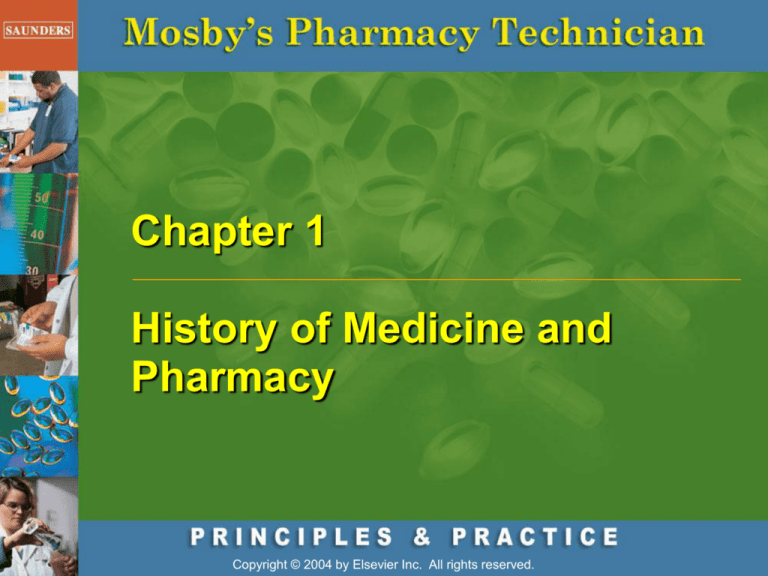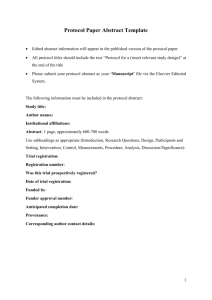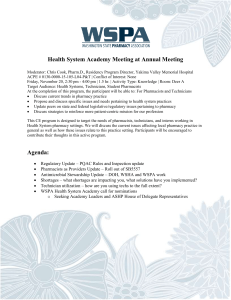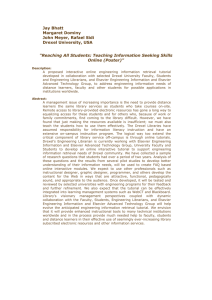
Chapter 1
History of Medicine and
Pharmacy
Copyright © 2004 by Elsevier Inc. All rights reserved.
Ancient Beliefs and Treatments
• Medicine has been practiced for
thousands of years
• Remedies such as herbals have been
used throughout history
• Many popular beliefs have disappeared,
for example: Trephining–a cut made
into the skull to give disease a portal
to leave through
Copyright © 2004 by Elsevier Inc. All rights reserved.
Ancient Beliefs and Treatments
• Severe illnesses caused by evil spirits
• Tribal shamans (medicine men) had
gift of being able to communicate
with spirits
• Other illnesses cured by the placebo
effect–patients believed so strongly
in the treatment rendered that they
were cured
Copyright © 2004 by Elsevier Inc. All rights reserved.
The Medical Staff
• Aesculapius–Greek God of medicine
• His symbol–a staff with a snake
wrapped around it
• Treatments for illnesses were based
on dreams and visions of the believers
• Authoritarians–set forth dogmatic
beliefs like gods being able to cure
illnesses
Copyright © 2004 by Elsevier Inc. All rights reserved.
Medicine in Its Infancy
• Plagues killed many people
• Microbes not known to be responsible
for many diseases
• Prayer–most common form
of treatment
Copyright © 2004 by Elsevier Inc. All rights reserved.
Medicine in Its Infancy
• Hippocrates–3rd generation physician
• Believed life consisted of a balance
of four elements linked to qualities
of good health: wet, dry, hot, cold
• Illnesses resulted in imbalance of four
humors–blood, phlegm, yellow bile,
black bile
Copyright © 2004 by Elsevier Inc. All rights reserved.
Medicine in Its Infancy
• Four humors were linked to the
four elements:
– Blood = air
– Phlegm = water
– Yellow bile = fire
– Black bile = earth
• Treatment: bloodletting, laxatives
Copyright © 2004 by Elsevier Inc. All rights reserved.
Medicine in Its Infancy
• Hippocrates–responsible for
advancements in medicine
• His observations included effects
of food and climate
• First physician to record patient’s
medical illnesses
• Promoted rest and eating light foods
Copyright © 2004 by Elsevier Inc. All rights reserved.
Medicine in Its Infancy
• Corpus Hippocratum–documentation
of Hippocrates’ writings
• Hippocratic oath–“Doctors act only
for the good of their patients and
keep confidential what they learn
about their patients.”
• Hippocrates–known as the Father
of Medicine
Copyright © 2004 by Elsevier Inc. All rights reserved.
Medicine in Its Infancy
• Aristotle–Greek philosopher and
scientist
• Responsible for many advancements
in biology and medicine
• Studied and classified various
organisms
• Described human anatomy from
observations after dissecting animals
Copyright © 2004 by Elsevier Inc. All rights reserved.
Medicine in Its Infancy
• Claudius Galen–followed many of
Hippocrates’ beliefs like eating a
balanced diet, exercise, and good
hygiene
• Contributed greatly to study
of medicine
• Wrote on topics such as physiology,
anatomy, pathology, diagnosis, and
pharmacology
Copyright © 2004 by Elsevier Inc. All rights reserved.
Medicine in Its Infancy
• Roger Bacon–philosopher and
alchemist
• Refined and explained the importance
of the experimental methods
Copyright © 2004 by Elsevier Inc. All rights reserved.
Medicine in Its Infancy
• Paracelsus–Swiss physician and
alchemist
• Believed in treating illnesses with one
medicine at a time
• Produced many nontoxic medications
• Introduced Laudanum–popular tonic
to deaden pain
Copyright © 2004 by Elsevier Inc. All rights reserved.
Ancient Herbal Remedies
• Prevalent treatments–multiple mixtures
of plants, roots, and other concoctions
• Belief held that digesting the type of
plant resembling organ affected by
the disease cured the illness
Copyright © 2004 by Elsevier Inc. All rights reserved.
Prevalent Ancient Herbal Remedies
• Examples of prevalent treatments:
– Garlic–inflammation of bronchial
tubes
– Liverwort plant–for liver problems
– Wine and pepper–stomach ailments
– Onions–worms
– Tiger fat–joint pain
Copyright © 2004 by Elsevier Inc. All rights reserved.
Medicine in the Fourteenth Century
• Belief that evil spirits caused disease
• Treatments through trial and error–
some were effective; some caused
death
• New scientists emerged and new
methods were devised to test
hypotheses, which gave way to
advancements
Copyright © 2004 by Elsevier Inc. All rights reserved.
Medicine in the Eighteenth Century
• Religious leaders became very active
in researching medicinal remedies to
treat the sick
• Gregor Mendel–famous scientist and
monk–found the basis of genetics and
how genes are woven into heredity
• Known as the Father of Genetics
Copyright © 2004 by Elsevier Inc. All rights reserved.
Medicine in America
• Early America–immigrants brought
diseases from other parts of the world
• Doctors–responsible for diagnosing
conditions and preparing remedies
to cure patients
• First druggists were doctors
Copyright © 2004 by Elsevier Inc. All rights reserved.
Medicine in America
• Early American remedies:
– Cinchona bark (quinine)–malaria
– Mercury–syphilis
(very toxic and caused deaths)
• Average life expectancy–40 years
• Childhood diseases–no vaccines
available
Copyright © 2004 by Elsevier Inc. All rights reserved.
Medicine in America
• Most treatments were concoctions
handed down through family tradition
• There were few doctors and fewer
hospitals throughout the colonies
• Civil War–brought about a clear
division between physicians and
pharmacists
Copyright © 2004 by Elsevier Inc. All rights reserved.
The Use of Opium and Alcohol
• Most popular tonic for medicinal use;
very addictive
• Given as a sedative to dull the
sensation of pain
• Civil War–used to treat painful wounds
Copyright © 2004 by Elsevier Inc. All rights reserved.
The Use of Opium and Alcohol
• Households–used it for less severe
problems and depression
• Addiction–alarming rate
• Absinthe–alcohol-based liquid; herb
mixed with alcohol; served with water
and sugar for tapeworms
Copyright © 2004 by Elsevier Inc. All rights reserved.
Early Pharmacists
• Apothecaries (pharmacies)–sprung up
after the Civil War
• Manufacturing plants were built
• Training took place to give medications
accurately
• Pharmacists moved into the role
of druggists
Copyright © 2004 by Elsevier Inc. All rights reserved.
Early Pharmacists
• First Pharmacy School–Philadelphia
College of Pharmacy and Sciences
(1821)
• 1800s–Pharmacists compounded
nearly every drug ordered by
physicians
• Cisterns–large ornate jars used to
store various herbs and ingredients
Copyright © 2004 by Elsevier Inc. All rights reserved.
Early Pharmacists
• Recipe book–where remedies were
contained
• Examples: chalk–for heartburn; rose
petals–for headaches
• Apothecary–filled with oils, herbs,
and spices
Copyright © 2004 by Elsevier Inc. All rights reserved.
Early Pharmacy Technicians
• First pharmacy technicians–family
members of the pharmacists who
owned the corner drugstore
• Wives–helped behind the counter
and waited on customers
• Older children–filled in as clerks,
waited on customers, and stocked
shelves
Copyright © 2004 by Elsevier Inc. All rights reserved.
Early Pharmacy Technicians
• Clerk training–filling medication
drawers, profiling doctor’s orders,
compounding simple mixtures
• Early clerks–became pharmacy
technicians
Copyright © 2004 by Elsevier Inc. All rights reserved.
The Soda Fountain/Pharmacy
in America
• Early pharmacists played a minimal
role in healthcare
• 1800 to 1900–soda fountain became
an extension of a town’s drugstore
• Mineral water–became treatment
for different ailments
Copyright © 2004 by Elsevier Inc. All rights reserved.
The Soda Fountain/Pharmacy
in America
• Pharmacists–sold soda and ice cream,
worked the lunch counter, and filled
the day’s prescriptions
• Pharmacy setting–promoted trust in
the pharmacist
Copyright © 2004 by Elsevier Inc. All rights reserved.
Changing Pharmacy
• Doctor of pharmacy degree
(PharmD) required in United States
• Today’s druggist–needs in-depth
and broad communication skills
with doctors and customers
• Today’s technicians–required
to get education in addition to
on-the-job training in some states
Copyright © 2004 by Elsevier Inc. All rights reserved.
Changing Pharmacy
• Technician duties–preparing
prescriptions and compounding
• Hospital duties–supply floorstock,
prepare parenteral medications,
transcribe doctor’s orders, fill
patient’s cassettes
• Specialized technicians–order
drugs and supplies
Copyright © 2004 by Elsevier Inc. All rights reserved.
Changing Pharmacy
• Technicians need strong
communication skills
• Pharmacists–can also specialize in
interpreting lab results, oncology,
and compounding, to name a few
Copyright © 2004 by Elsevier Inc. All rights reserved.
Protocol
• A set of standardized rules that are
agreed on within a pharmacy setting
• Drug Education Coordinators (DECs)–
meet to discuss new medications,
review them, and determine if they are
better and cost effective; also consider
new literature from drug companies
Copyright © 2004 by Elsevier Inc. All rights reserved.
Trust in Pharmacist/Trust
in Technicians
• Pharmacists–can be trusted to provide
truthful information and be a confidant
• Clinical pharmacist–works alongside
doctors to prescribe medications and
dosages
• Community pharmacy–pharmacists
required to counsel patients;
technicians trusted to provide the best
care by filling the correct medication
Copyright © 2004 by Elsevier Inc. All rights reserved.
Technicians of the
Twenty-First Century and Beyond
• Pharmacists–moving into a more
highly clinical role not only counseling
but also working with medical staff
• Technicians–moving into transcribing
orders, pulling medications, and filling
prescriptions
Copyright © 2004 by Elsevier Inc. All rights reserved.





